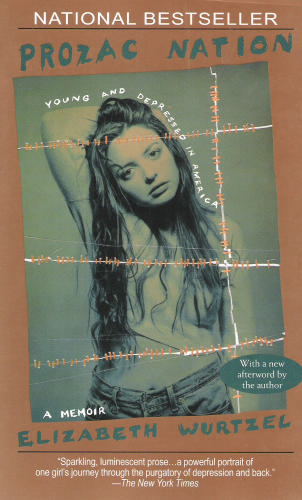In my early 20s, I adored the Pretty Hate Machine and Broken albums from Nine Inch Nails. I still listen to them on occasion, but for the most part I grew tired of them because all Trent Reznor’s screaming about pain, loneliness, depression and rage got old. He never told us how to go from hopelessness to wisdom and personal growth.
Mood music:
[spotify:track:5ttpMaPCxRceWlR1kziBDZ]
That’s how Kerry Cohen, an author I’ve come to admire, feels about Elizabeth Wurtzel, author of Prozac Nation. In her latest Huffington Post blog entry, Cohen explains how important that Wurtzel book was to her at a fragile time in her life:
Wurtzel named a truth for us that psychology wouldn’t touch. We were a generation of depressives, of borderlines, of personality disorders. We were Generation Empty. I loved Wurtzel for how she made me feel less alone, seen.
But Cohen reached an impasse with Wurtzel:
My editor for Loose Girl summed it up when she said, “America loves a redemption story.” We wouldn’t settle anymore for emptiness that goes nowhere. People wanted to know how to get better. … There are times I wish I could call Wurtzel on the phone and tell her how much her work meant to me. … But until she has something new to say, something that is still truly about our generation, I wish she would stop.
I’ve never read Prozac Nation. I haven’t read Cohen’s books in their entirety, either, though I’ve dug into parts of Loose Girl and Seeing Ezra. I’ve mostly become a fan of her work through her blog posts and what she shares on Facebook and Twitter. This latest post hits my core.
In my early 20s, I reveled in my depression. I filled notebooks full of poetry about my emptiness. I somehow thought it made me cool. I hit upon something that I felt “normal” people couldn’t experience. This somehow made me smarter, better. I was just stupid. I’ve searched everywhere for those notebooks. Not because I think I’ll find some brilliant spark from the past to feed my creativity today, but because I think I’d get some cheap laughs from it.
I remember going on a date in 1989 and spending the whole dinner telling the young lady about how bitter I was toward my parents and how dark I saw the world. That relationship didn’t survive the first date.
Eventually, I realized that the pain wasn’t going to send me anywhere in life unless I used it to gain a better understanding of who I was and what kind of good I was capable of. The ancient Greek scribe Aeschylus described the need to use suffering for personal growth this way:
In our sleep, pain which cannot forget
falls drop by drop upon the heart
until, in our own despair, against our will,
comes wisdom through the awful grace of God.
Robert F. Kennedy, who recited that poem to a shocked and angry crowd the day MLK was assassinated, understood all too well. I’ve tried hard to take those words to heart. In this blog, I’ve tried to always explain how, in my personal experience, things get better. If all I did here was complain, this blog would go nowhere. I must always remember that.
Thanks for the reminder, Kerry.

